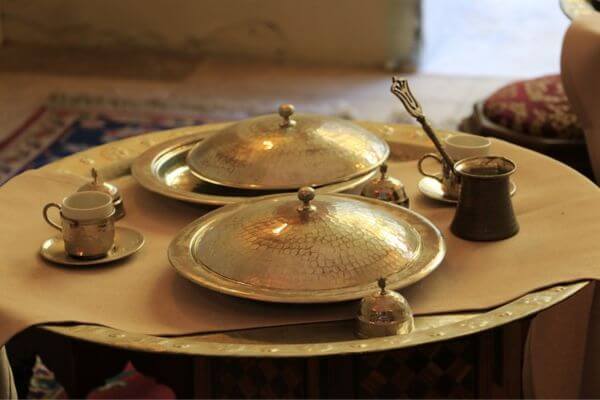Coffee, the beloved beverage that has captured the hearts of people worldwide, is more than just a simple drink. It is a cultural phenomenon that transcends borders and unites people from diverse backgrounds.
Throughout history, coffee has woven itself into the fabric of various societies, giving rise to unique rituals and ceremonies that celebrate its flavors, aromas, and social significance.
In this article, we embark on a journey across continents to explore the captivating world of coffee rituals and the cultural traditions that have shaped the way coffee is enjoyed in different corners of the globe.
Coffee has a rich and fascinating history that dates back centuries. It originated in the highlands of Ethiopia, where legend has it that a goat herder named Kaldi discovered the energizing effects of coffee when he noticed his goats becoming lively after consuming the cherries of a certain tree.
This discovery led to the cultivation and eventual spread of coffee throughout the world. Today, coffee is one of the most widely consumed beverages, with each region and culture putting its own unique spin on how it is enjoyed.
In Ethiopia, the birthplace of coffee, the coffee ceremony is a cherished tradition. It is a time-honored ritual that brings people together to share stories, engage in conversation, and enjoy the flavors of freshly brewed coffee.
The ceremony involves roasting coffee beans over an open flame, grinding them by hand, and brewing the coffee in a traditional clay pot called a jebena. The rich aroma fills the air as small cups, known as finjans, are filled with the brewed coffee, inviting participants to savor the moment and appreciate the cultural significance of this ancient practice.
In Turkey, coffee has its own distinct charm. Turkish coffee is renowned for its strong flavor and unique preparation method. It is finely ground to a powder-like consistency and brewed in a small, long-handled pot called a cezve.
The cezve is placed on a hot sand-filled tray or stove, allowing the coffee to slowly heat and release its intense flavors. The brewed coffee is poured into small cups, including the thick layer of coffee grounds that settles at the bottom.
Turkish coffee is not merely a beverage; it is a social experience, often accompanied by traditional sweets and served with a side of fortune-telling using the leftover coffee grounds. This time-honored tradition brings people together, creating an atmosphere of warmth, conversation, and shared moments.
Italy, known for its rich culinary heritage, has also made its mark in the coffee world with the art of espresso. Italians take their coffee seriously, and the preparation of espresso is considered an art form.
From the careful selection of high-quality beans to the precise grinding and tamping techniques, every step is crucial in creating the rich, concentrated elixir that is espresso. Italians often enjoy their espresso standing at a café counter, engaging in lively conversations, and savoring the intense flavor and aroma that defines this iconic beverage.
Espresso has become synonymous with Italian culture, representing a moment of indulgence, a pause in the bustling rhythm of life, and a celebration of the artistry of coffee making.
In Japan, a country renowned for its meticulous attention to detail and craftsmanship, coffee has found a place in the hearts of many. Pour-over coffee, known as “pour-over” or “drip coffee” in Japan, has gained popularity for its meticulous brewing process and emphasis on extracting the subtle nuances of the coffee beans.
Japanese coffee shops often prioritize the quality of the beans, ensuring they are freshly roasted and carefully brewed to create a clean and delicate cup of coffee.
The pour-over method involves slowly pouring hot water over a bed of coffee grounds, allowing the flavors to slowly infuse and create a nuanced and aromatic brew. This method embodies the Japanese principle of “omotenashi,” which emphasizes hospitality and attention to detail in serving the perfect cup of coffee.
As we explore the world of coffee rituals, we discover that each culture has its own unique way of celebrating this beloved beverage. From the elaborate Ethiopian coffee ceremony to the refined artistry of Italian espresso, and the meticulous pour-over method in Japan, coffee rituals offer a glimpse into the cultural heritage and values of a society.
These rituals bring people together, fostering connection, conversation, and shared moments of enjoyment.
The coffee rituals around the world are a testament to the enduring love and appreciation for this beloved beverage. Whether it’s the traditional coffee ceremonies of Ethiopia, the social experience of Turkish coffee, the artistry of Italian espresso, or the meticulous pour-over method in Japan, coffee rituals reflect the cultural diversity and rich traditions of different societies.
As we partake in these rituals, we not only savor the flavors and aromas of coffee but also engage in a shared experience that transcends language and borders. So, let us raise our cups, embrace the coffee rituals of the world, and celebrate the global bond that coffee creates among us all.
Ethiopia: The Birthplace of Coffee and the Coffee Ceremony
Ethiopia is known as the birthplace of coffee, and the coffee ceremony is an integral part of Ethiopian culture. The ceremony involves roasting coffee beans over an open flame, grinding them by hand, and brewing the coffee in a traditional clay pot called a jebena.
The coffee is then served in small cups called finjans, and participants engage in conversations and share stories while enjoying the rich, aromatic brew.
Turkey: The Art of Turkish Coffee
Turkish coffee is renowned for its strong flavor and unique preparation method. The coffee is finely ground and brewed in a small, long-handled pot called a cezve. The pot is heated over a low flame, and the coffee is carefully poured into small cups, including the thick layer of coffee grounds.
The ritual of Turkish coffee is a social experience, often accompanied by traditional sweets and served with a side of fortune-telling using the leftover coffee grounds.
Italy: The Art of Espresso
In Italy, coffee is a way of life, and the art of espresso is deeply ingrained in the culture. Italians take their coffee seriously, and the preparation of espresso is a skill that is honed over time. From the perfect grind size to the precise extraction time, every step is crucial in creating the rich, concentrated shot of espresso.
Italians often enjoy their espresso standing at a café counter, savoring the intense flavor and vibrant aroma.
Japan: The Artistry of Pour-Over Coffee
Japan is known for its attention to detail and precision, which is reflected in the artistry of pour-over coffee. The pour-over method involves pouring hot water over coffee grounds in a slow and controlled manner, allowing for a precise extraction and highlighting the subtle flavors of the coffee.
Japanese coffee shops often prioritize the quality of the beans and the meticulousness of the brewing process, resulting in a delightful and harmonious coffee experience.
Morocco: The Magic of Moroccan Mint Coffee
In Morocco, coffee takes on a unique twist with the addition of mint leaves. Moroccan mint coffee is made by blending strong, dark coffee with fresh mint leaves and a touch of sugar. The result is a refreshing and aromatic beverage that is often served in ornate, decorative glasses.
The ritual of preparing and serving mint coffee is a gesture of hospitality and a way to welcome guests into Moroccan homes.
Greece: The Tradition of Greek Frappé
The Greek frappé is a beloved cold coffee beverage that has become an iconic symbol of Greek summer culture. It is made by shaking instant coffee, sugar, and water together to create a frothy mixture, which is then poured over ice and topped with milk or water.
The frappé is enjoyed leisurely, sipped through a straw while strolling along the streets or sitting at a café, providing a cool and refreshing respite from the Mediterranean heat.
Ethiopia: The Birthplace of Coffee and the Coffee Ceremony
Ethiopia is known as the birthplace of coffee, and the coffee ceremony is an integral part of Ethiopian culture.
The ceremony involves roasting coffee beans over an open flame, grinding them by hand, and brewing the coffee in a traditional clay pot called a jebena.
The coffee is then served in small cups called finjans, and participants engage in conversations and share stories while enjoying the rich, aromatic brew.
Brazil: The Tradition of Cafézinho
In Brazil, coffee holds a special place in the hearts of the people, and the tradition of cafézinho is deeply ingrained in the culture.
Cafézinho, which means “little coffee,” is a small and strong cup of black coffee served after meals or as a gesture of hospitality.
It is a simple yet cherished ritual that symbolizes warmth, friendship, and a moment of connection in the fast-paced Brazilian lifestyle.
Ethiopia: The Birthplace of Coffee and the Coffee Ceremony
Ethiopia is known as the birthplace of coffee, and the coffee ceremony is an integral part of Ethiopian culture.
The ceremony involves roasting coffee beans over an open flame, grinding them by hand, and brewing the coffee in a traditional clay pot called a jebena.
The coffee is then served in small cups called finjans, and participants engage in conversations and share stories while enjoying the rich, aromatic brew.
United States: The Rise of Specialty Coffee Culture
In recent years, the United States has witnessed a surge in specialty coffee culture, with a focus on high-quality beans, precise brewing methods, and unique flavor profiles.
From artisanal coffee shops to passionate homebrewers, coffee has evolved into an art form in the United States.
Coffee enthusiasts explore different brewing techniques, experiment with flavor combinations, and appreciate the nuances of coffee like never before.
In conclusion, the world of coffee is not only about the beverage itself, but also the fascinating traditions, rituals, and ceremonies that surround it. From the humble beginnings in Ethiopia to the global phenomenon it is today, coffee has woven its way into the fabric of societies around the world, leaving an indelible mark on cultures, traditions, and even popular culture.
Throughout this article, we have explored the diverse coffee rituals and ceremonies that celebrate the art of coffee preparation and consumption.
From the Ethiopian coffee ceremony’s communal experience to the socializing aspect of Turkish coffee, the refined artistry of Italian espresso, the meticulous pour-over method in Japan, and countless other traditions, coffee has become more than just a drink.
It is a catalyst for connection, conversation, and cultural celebration.
These coffee rituals serve as a reminder of the power of shared experiences. They bring people together, creating moments of warmth, laughter, and contemplation.
Whether it’s gathering around a traditional coffee ceremony, sipping an espresso at a bustling café, or enjoying a pour-over brew with friends, coffee rituals provide an opportunity to slow down, appreciate the present moment, and savor the flavors and aromas that coffee has to offer.
As we delve into the world of coffee rituals, we not only gain a deeper understanding of the cultural significance attached to this beloved beverage but also develop a sense of appreciation for the diversity and richness of human traditions.
Coffee has the remarkable ability to transcend borders, languages, and differences, uniting people in a shared love for its unique flavors and the experiences it brings.
So, whether you find yourself enjoying a traditional Ethiopian coffee ceremony, savoring a cup of Turkish coffee alongside delightful sweets, indulging in a velvety Italian espresso, or relishing a meticulously brewed pour-over coffee, remember that you are partaking in a global tradition that spans continents and generations.
Coffee rituals are a testament to the power of culture, heritage, and the universal language of appreciation.
In the end, coffee is more than just a beverage. It is a cultural ambassador, a symbol of hospitality, and a catalyst for connection.
So, let us raise our cups, embrace the diverse coffee rituals of the world, and celebrate the rich tapestry of traditions that make our coffee experiences truly special.
From Ethiopia to Turkey, Italy to Japan, and beyond, the world of coffee rituals invites us to savor the journey and enjoy the moments of togetherness that coffee graciously offers.
Cheers to coffee, and cheers to the vibrant tapestry of cultures it representes!



